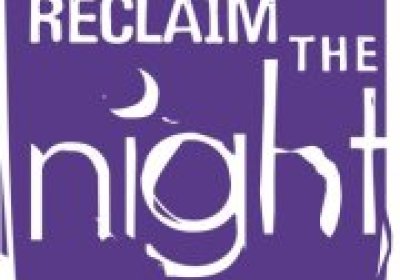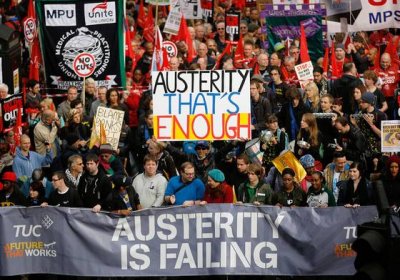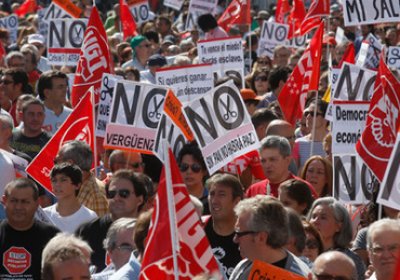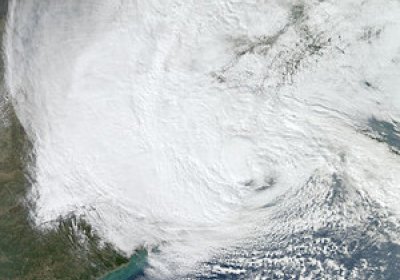Socialist Alliance activist and feminist Liah Lazarou gave the speech below to Adelaide’s Reclaim the Night rally on October 26.
* * *
943
Venezuelan President Hugo Chavez’s re-election on October 7 with more than 55% of the vote was vital for two reasons.
First, the Venezuelan people blocked the return to power of the neoliberal right. Had they won, these US-backed forces would have worked to roll back important advances for the poor majority won since Chavez was first elected in 1998.
About 200,000 people marched in London, Glasgow and Belfast on October 20 against the austerity programs of British Prime Minister David Cameron's government.
The trade unions that called the actions put the numbers of participants at: London 150,000, Glasgow 10,000 and Belfast 10,000. Marchers were of all ages and backgrounds — trade union members, students, families affected by cuts to health and social services and women's rights advocates, among others.
The economic, social and territorial crisis facing the Spanish state is morphing into a crisis of the two-party system that has provided either Popular Party (PP) or Spanish Socialist Workers Party (PSOE) governments for 30 years.
Those who have been gaining electorally are Basque, Catalan and Galician nationalist forces (left and right), and the United Left (IU) and Union, Progress and Democracy (UpyD).
As of October 27, Hurricane Sandy, a storm so freakish it has been termed “frankenstorm”, had killed at least 38 people in Caribbean nations and was bearing down on the north-east of the United States.
Indonesian security forces attacked West Papuan independence rallies in several cities on October 23.
West Papua Media (WPM) said the worst violence took place in Manokwari where four people were shot by army soldiers and many others were beaten.
There were fears a massacre would take place during a confrontation between protesters and security forces, after authorities blocked people's attempts to protest. Eleven student activists were arrested, including some who had been injured, Jubi said on October 24.
Under the stewardship of several British Columbia indigenous First Nations, close to 5000 people from all over the Canadian province came together on October 22 to demand the planned Enbridge and Kinder Morgan pipelines be stopped.
For the past few months, people all over BC had been recruiting people to join the rally and to engage in peaceful civil disobedience.
The presidential election victory of Hugo Chavez is a vital component in the continuation of the Bolivarian revolution, which has now been under way for 13 years.
A defeat would have resulted in a massive attack on the working class of Venezuela. There is no doubt that, had Henrique Capriles Redonski won, he would have begun undermining and where possible breaking up the social missions and putting an end to nationalisations and returning to a pro-US foreign policy.
Bolivia is one of the few countries that has consistently opposed treating biodiversity as a commodity at the United Nations Conference of Parties to the Convention on Biodiversity held in Hyderabad, India, over October 1-19. It has raised its voice against pro-market approaches in implementing the Strategic Plan and Aichi Targets of the UN's Convention on Biodiversity (CBD).
In a cabinet meeting with his top ministers on October 20, Venezuelan President Hugo Chavez strongly criticised his political team for failing to show commitment to the participatory democratic model proposed by his government. Chavez urged them to undertake serious “self-criticism”.
It was the first cabinet meeting since the October 7 presidential elections, in which Chavez won a third presidential term with more than 55% of the vote.
Women and girls are among the hardest hit by the anti-working-class policies of Britain’s Conservative-Liberal Democrat coalition government.
A report published in The Guardian earlier this year showed that rising taxes and cuts to social spending have hit women three times as hard as men.
Women aged 50-64 have been hit hardest by rising unemployment since the coalition came to power. It is up 31% compared to an overall rise of 4.2% in the country (to 2.6 million people).
We've been told opportunity, prosperity and more freedoms came to Australia under the banner of capitalism and the “free-market” in the 1980s and 90s after the economic slump of two recessions.
But when neoliberal ideals and rhetoric are set aside, a grim picture of the great, and ever growing, divide between the rich and poor in Australia emerges yet again.
Between 1920 and 1980, inequality in Australia was shrinking, until a perceived sense of national stagnation took hold and the Hawke-Keating Labor government made the leap into the global free market.
- Previous page
- Page 2
- Next page






